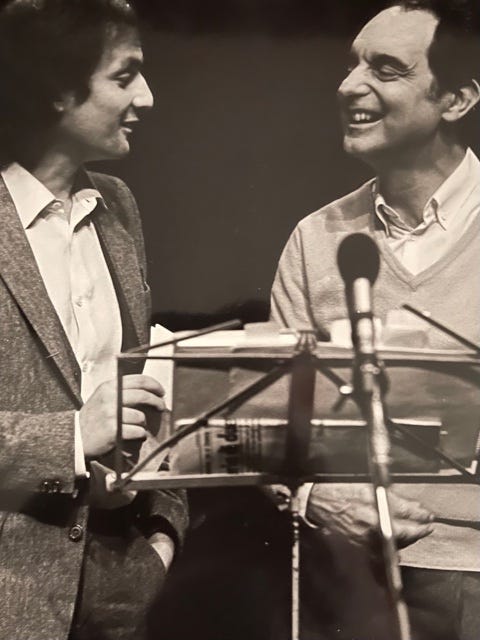In 1981, I reviewed Italo Calvino’s If on a Winter’s Night a Traveler for the London Review of Books. (You can find that review here: https://www.lrb.co.uk/the-paper/v03/n17/salman-rushdie/calvino - unless the paywall stops you.) Soon after that I was invited to introduce a reading by Calvino at the Riverside Studios in London. I was nervous, because I admired him greatly, and would have to talk about his work in his presence. What if he didn’t like what I said? Then things became worse because he asked to see my text before I delivered it. Eeek, I thought. But fortunately, early in my piece, I compared him to the classic writer of antiquity, Apuleius, author of The Golden Ass. “Ah!” he said when he saw that. “Apuleio! Very good.” After that we became friends.
A year later I was at a dinner in Calvino’s honor hosted by the London-based Italian writer Gaia Servadio. As it happened it was the very day in October on which Gabriel García Márquez’s Nobel Prize was announced. Calvino was high on the list of writers whom the French call Les Nobelizables – the ones worthy of the prize – but it eluded him. That night people carefully avoided the subject of García Márquez’s victory until I decided to acknowledge the elephant in the room.
“Italo,” I said, “have you heard the news from Stockholm?”
“Yes.” he replied, with some heat. “It’s a scandal.”
Then, perhaps realizing how that sounded, he added. “To give it to García Márquez before giving it to [Jorge Luis] Borges is like giving it to the son before the father.”
Which was true.
Calvino was kind to me. When my novel Midnight’s Children was published in Italy he wrote a long, favorable review of it in La Repubblica, and that was the way in which Italian readers first became acquainted with my work. Calvino’s seal of approval was important to me then, and it still is.
*
He died in Siena, Italy, in September 1985, of a cerebral hemorrhage. Later I spent an evening with his widow Chichita (Esther Judith Singer) and she told me an infinitely moving story. In his final conscious moment, as he briefly drifted out of his last coma, he spoke what were his last words: “Giovanni di Marsalia, fenomenologo…” (“Giovanni of Marsalia, phenomenologist…”) Afterwards, she asked many people if they had ever heard of such a person, but nobody had, nor did anyone know where “Marsalia” was. Some time later, she was going through an archival box of some of his earliest writings, his columns for the Piedmont edition of the leftist newspaper L’Unita – he was a Communist when young, but left the party because of the suppression of the Hungarian uprising and the crimes of Joseph Stalin. In one of those early columns she found an account of an invented Communist paradise. It was called Marxalia.
How beautiful, I thought, that in the last moment of his life his thoughts had gone all the way back to that beginning.
I hope he found his Marsalia.
“I knew him so well,” Chichita said, “that I could hear the punctuation in those words. Giovanni di Marsalia, comma, fenomenologo, comma. But he never finished the sentence.”
So he ended on a comma: the most perfectly Calvino-like end.





Giovanni Calvino is how Italians refer to the theological reformer John Calvin. Some scholars have drawn a parallel between the ways Marx and Calvin thought about material objects and how their value changes with consecration/circulation. And of course many phenomenologists are also Marxists - though the relationship is problematic. A network of lines that intersect.
I'm not sure if it makes it any easier to understand what he could have possibly meant, but "fenomenologico" corresponds to the adjective "phenomenological".